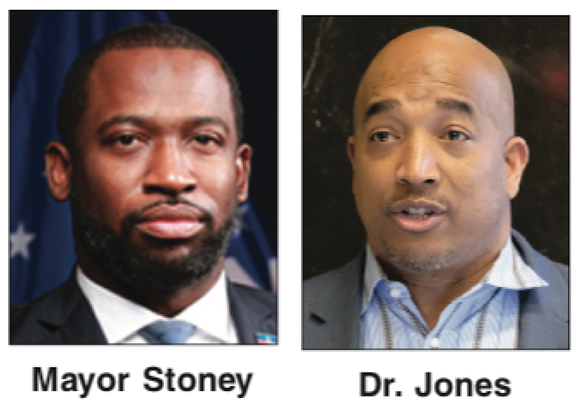It’s a deal
City and RVA Diamond Partners finalize $2.44B agreement; council vote comes next
Jeremy M. Lazarus | 4/27/2023, 6 p.m.
The Diamond District – Richmond’s biggest ever development – is now at the starting gate after seven months of negotiations between the city and RVA Diamond Partners LLC (RVADP), the private developer.
City Council is now rushing to clear the final development agreement. A briefing is set for next Monday, May 1, with a vote of approval anticipated at the first regular council meeting on Monday, May 8, to enable the public-private partnership to get underway.
Expected take up to 15 years to build out, the ambitious $2.44 billion development is projected to create thousands of construction and permanent jobs, boost participating Black-owned businesses and bring new hotels, retail space and offices. Some 2,600 homes and apartments, with more than 20 percent earmarked for people with lower incomes, including current residents of public housing, also are part of the plan.
It also is projected to generate $1 billion in new revenue for city coffers over 45 years, according to the Davenport and Co., the city’s financial adviser. However, most of the new revenue is forecast to be generated after 2038 as the city’s borrowing to push the project along is paid off.
The project is targeted for nearly 68 acres of largely city-owned property on Arthur Ashe Boulevard where the aging Diamond baseball stadium now stands and being undertaken by a multi-racial business coalition led by Washington-based Republic Properties Corp., Henrico County-based Thalhimer Realty Partners and Chicago-based Loop Capital, the largest Black-owned investment bank in the world.
The development builds on the surge of growth in the nearby Scott’s Addition that has already has brought hundreds of new apartments and businesses to the area.
In Mayor Levar M. Stoney’s view, “We have hit a home run with this project, and our residents will reap the benefits for years to come.”
Council President Michael J. Jones agrees, describing the development as “smart growth” that “will benefit our community with jobs, housing, sports, and entertainment and change the trajectory of the area and the city.”
The freshly inked agreement includes changes from the original deal announced last September, largely due to the surge in interest rates that have skyrocketed in the past year. Since October 2021, the Federal Reserve rate for bank borrowing has shot up from 0.8 percent to nearly 5 percent, city officials have noted, making borrowing far more expensive.
That has impacted one key ingredient of the development— construction of a new 9,000-seat baseball stadium for Richmond’s minor league baseball team, the Richmond Flying Squirrels, the Double A affiliate of the Major League San Francisco Giants.
There remains uncertainty about the stadium, which is projected to cost $110 million, according to Davenport.
The new agreement sent to the council calls for the stadium to be built and ready for the 2026 season, but Major League Baseball, which fully controls minor league baseball, has yet to sign off.
MLB has set a deadline for communities such as Richmond with aging stadiums to have modern stadiums ready for play in 2025 or lose their team.
Mayor Stoney has expressed confidence that the extension will be granted once the scope of the city’s commitment is recognized.
The Richmond Flying Squirrels, though, have yet to agree to accept a stadium lease that would substantially boost their costs, nor has Virginia Commonwealth University, which also has planned to use the new stadium as the home for its baseball team.
The analysis from Davenport indicates that the Squirrels and VCU each may have to pay up to $1.5 million a year to lease the stadium.
Taxpayers also will be picking up a bigger share of the tab for this development.
The revenue to finance the city’s share of the development – public infrastructure – was to come from the future taxes the development is to create, known as tax-increment financing or TIF. Under the updated agreement, the taxes from properties outside the 68 acre-footprint must be included to cover the increased borrowing costs.
Along with financing the baseball stadium, the city also is to use the tax income from the Diamond District’s new developments to provide a $25 million replacement for the current Sports Backers track and soccer stadium, that will become part of a planned VCU Athletic Village across Hermitage Road from the Diamond District.
The Diamond District is be completed in four phases, with the first phase involving an investment of $627 million.
Along with the stadium, the first phase is to include a 180-room hotel; 1,134 apartments, 20 percent targeted for families with below-average incomes and 39 for public housing residents; 92 duplex-style for-sale homes, 18 which would be earmarked for lower-income families; and a public park that would eventually occupy 11 acres.
The agreement calls for the development team to do its best to legally ensure city residents are first in line for new jobs and to achieve a goal of 40 percent participation of Black-owned and minority-owned companies, in addition to the 45 percent share that minority-owned businesses that are part of RVADP already have.
Jason Guillot of Thalhimer Realty Partners, called the final agreement “an important milestone” and said the RVADP looks forward to transforming the concept plan into an “amazing mixed-use development.”
Lincoln Saunders, the city’s chief administrative officer, said the agreement that the city and RVADP have put together embodies “the best agreement to build a stadium, a public park, affordable housing and many other amenities ... despite rising interest rates and economic headwinds.”







